On This Page
Conference Information
July 14, 2022 Notice re Juror Demographic Data
July 12, 2022 Supreme Court Actions
Notice – Jury Reforms – Supreme Court Action
Supreme Court’s Administrative Determinations on the Recommendations
Order Adopting Rule Amendments and New Rule
Order Authorizing the Attorney-Conducted Voir Dire (ACDV) Pilot Program
April 28, 2022 Recommendations
Notice listing the Recommendations and requesting Comments, with the three Subcommittee reports attached.
April 28, 2022 letter from Senator Steven V. Oroho, Senate Republican Leader
April 25, 2022 letter to Senator Oroho from Administrative Director Glenn A. Grant
Nov. 10 and Nov. 12, 2021 Conference
Judicial Conference Sessions (Video Recordings)
Day 1
Chief Justice Rabner's Opening Remarks
First Panel: Voir Dire in New Jersey
Second Panel: Jury Representativeness
Third Panel: Peremptory Challenges & the Right of Civic Engagement
Fourth Panel: Supporting Juror Impartiality
Chief Justice Rabner's Day 1 Closing Remarks
Day 2
Acting Administrative Director Grant’s Day 2 Opening Remarks
Fifth Panel: Juror Records & Demographic Data
Sixth Panel: Toward Representative Juries
Public Testimony (listed alphabetically by speaker)
Hon. Barry T. Albin, Associate Justice
The Reverend Dr. Charles Franklin Boyer, Founding Director, Salvation and Social Justice
Hon. Andrew J. Bruck, Acting Attorney General
Domenick Carmagnola, President, New Jersey State Bar Association
Ryan P. Haygood, President & CEO, New Jersey Institute for Social Justice
Hon. Joseph E. Krakora, Public Defender
Aidan P. O’Connor, President, Association of Criminal Defense Lawyers of New Jersey
Henal Patel, Board Director, New Jersey League of Women Voters
Kathleen M. Reilly, President, New Jersey Association for Justice
Ryan Richman, President, New Jersey Defense Association
Akil Roper, Vice President & Assistant General Counsel, Legal Services of New Jersey
Michele N. Siekerka, President & CEO, New Jersey Business & Industry Association
Pastor Ronald L. Slaughter, St. James AME Church
Hon. Esther Suarez, Hudson County Prosecutor & President, County Prosecutors Association of New Jersey
Matthew J. Tharney, President, Trial Attorneys of New Jersey
Karen Thompson, Senior Staff Attorney, American Civil Liberties Union of New Jersey
Gregg L. Zeff, Legal Redress Chair, NAACP of New Jersey
Chief Justice Rabner's Closing Remarks
See conference agenda
Guide to the Judicial Conference on Jury Selection
Print Version (no hyperlinks)
Online Version
Guide
Attachments
Attachment A
Attachment B
Attachment C
Attachment D
Attachment E
Attachment F
Attachment G
Attachment H
Attachment I
Attachment J
Attachment K
Attachment L
Press Release - Judicial Conference on Jury Selection Gathering for Second Day (Nov. 11, 2021)
Press Release - Judicial Conference Assembles Supreme Court Justices, Experts, and Key Stakeholders to Improve Jury Selection Process (Nov. 4, 2021)
Notice to the Bar and Public — Judicial Conference on Jury Selection - Guidance Document and Request for Public Comment (Oct. 19, 2021)
Notice to the Bar and Public — Judicial Conference on Jury Selection - Preliminary Information and Invitation to Participate (Sept. 28, 2021)
Materials Presented at the Conference
First Panel: Voir Dire in New Jersey
- Voir Dire in New Jersey. Part 1. (Assignment Judge Lisa Thornton)
- Voir Dire in New Jersey - Part 2. Attorney Conducted Voir Dire. (Public Defender Joseph E. Krakora)
Second Panel: Jury Representativeness
- Jury Representativeness. Part 1. (Professor Nina Chernoff)
- Jury Representativeness. Part 2. (Mary Rose, Ph.D.)
Third Panel: Peremptory Challenges & the Right of Civic Engagement
- Peremptory Challenges and the Right of Civic Engagement. Part 1. (Howard Berchtold. Will Snowden.)
- Peremptory Challenges and the Right of Civic Engagement. Part 2. (Gregg Zeff.)
Fourth Panel: Supporting Juror Impartiality (Judge Hany Mawla, Judge Edward McBride, Jr., Prosecutor Camelia Valdes)
Fifth Panel – Juror Records and Demographic Data
Sixth Panel – Toward Representative Juries
- No Materials
Speakers
- Opening Keynote
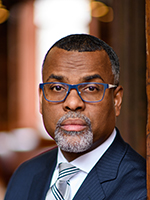
Eddie S. Glaude Jr. is an intellectual who speaks to the complex dynamics of the American experience. His most well-known books, Democracy in Black: How Race Still Enslaves the American Soul, and In a Shade of Blue: Pragmatism and the Politics of Black America, take a wide look at black communities, the difficulties of race in the United States, and the challenges our democracy face. He is an American critic in the tradition of James Baldwin and Ralph Waldo Emerson. In his writings, the country’s complexities, vulnerabilities, and the opportunities for hope come into full view. Hope that is, in one of his favorite quotes from W.E.B Du Bois, “not hopeless, but a bit unhopeful.”
He is the James S. McDonnell Distinguished University Professor and chair of the Department of African American Studies, a program he first became involved with shaping as a doctoral candidate in Religion at Princeton. He is the former president of the American Academy of Religion. His books on religion and philosophy include An Uncommon Faith: A Pragmatic Approach to the Study of African American Religion, African American Religion: A Very Short Introduction and Exodus! Religion, Race and Nation in Early 19th Century Black America, which was awarded the Modern Language Association’s William Sanders Scarborough Book Prize. Glaude is also the author of two edited volumes, and many influential articles about religion for academic journals. He has also written for the likes of The New York Times and Time Magazine.
Known to be a convener of conversations and debates, Glaude takes care to engage fellow citizens of all ages and backgrounds – from young activists, to fellow academics, journalists and commentators, and followers on Twitter in dialogue about the direction of the nation. His scholarship and his sense of himself as a public intellectual are driven by a commitment to think carefully with others in public.
Glaude’s most recent book, Begin Again: James Baldwin’s America and Its Urgent Lessons for Our Own, was released on June 30, 2020. Of Baldwin, Glaude writes, “Baldwin’s writing does not bear witness to the glory of America. It reveals the country’s sins, and the illusion of innocence that blinds us to the reality of others. Baldwin’s vision requires a confrontation with our history (with slavery, Jim Crow segregation, with whiteness) to overcome its hold on us. Not to posit the greatness of America, but to establish the ground upon which to imagine the country anew.”
Some like to describe Glaude as the quintessential Morehouse man, having left his home in Moss Point, Mississippi at age 16 to begin studies at the HBCU. He holds a master’s degree in African American Studies from Temple University, and a Ph.D. in Religion from Princeton University. He began his teaching career at Bowdoin College. In 2011 he delivered Harvard’s Du Bois lectures. In 2015 he was awarded an honorary doctorate from Colgate University, delivering commencement remarks titled, “Turning Our Backs” that was recognized by The New York Times as one of the best commencement speeches of the year. He is a columnist for Time Magazine and a MSNBC contributor on programs like Morning Joe, and Deadline Whitehouse with Nicolle Wallace. He also regularly appears on Meet the Press on Sundays.
- First Panel
Hon. Joseph F. Lisa, P.J.A.D. (Ret.)
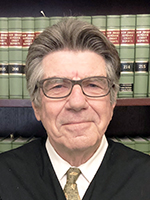
After twenty-two years in private practice, Judge Lisa was appointed to the Superior Court in May 1991. He served in the Civil and Criminal Divisions in the Gloucester/Cumberland/Salem Vicinage. He was the Presiding Criminal Judge in the Vicinage from 1994 to 2000, and he served as the Statewide Chair of the Conference of Criminal Presiding Judges from 1996 to 2000.
In January 2001, Judge Lisa was assigned to the Appellate Division. He retired from active service in September 2011. During his last three court terms, he was a Presiding Judge of the Appellate Division. Judge Lisa is presently serving in the Appellate Division on recall status, conducting CASP conferences, sitting on occasional plenary calendars, and presiding over Special Master proceedings assigned to him by the Supreme Court.
During his judicial tenure, Judge Lisa chaired the Ad Hoc Committee on Bail Forfeiture, the Special Supreme Court Committee on Peremptory Challenges and Jury Voir Dire, the Supreme Court Committee on Jury Selection in Civil and Criminal Trials, and the Megan's Law Three-Judge Disposition Committee. He also served as a member of the Commission on Professionalism in the Law, the Criminal Practice Committee, and the Trial Judges' Committee on Capital Causes.
Judge Lisa received his bachelor's degree from the University of Pennsylvania in 1966, and his law degree from Georgetown University Law School in 1969.
Hon. Lisa P. Thornton, A.J.S.C.
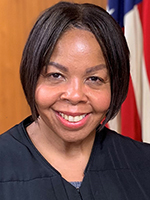
Judge Lisa P. Thornton was appointed to the Superior Court bench in January of 2008. She has served as the Supervising Special Civil Part Judge, Presiding Judge of the Family Part and in 2014 was appointed to serve as the Assignment Judge for the Monmouth Vicinage.
Prior to her appointment to the bench, Judge Thornton served as Chief of Staff for the Department of Law and Public Safety where she assisted the Attorney General with the overall management and oversight of the Department and its approximately 9,000 employees. Unrivaled in depth, and complexity, the New Jersey Department of Law and Public Safety is responsible for protecting citizens’ civil and consumer rights, promoting highway traffic safety, maintaining public confidence in the alcoholic beverage, gaming and racing industries and providing legal services and counsel to other state agencies. As Chief of Staff, Judge Thornton spearheaded a statewide criminal justice initiative that addressed prevention, enforcement and re-entry.
Prior to serving as Chief of Staff for the Department of Law and Public Safety, Judge Thornton served as Senior Counsel to Governor Jon Corzine in 2006. Assigned to the Authorities Unit, responsible for monitoring public boards and commissions, she advised the Governor on a variety of issues including healthcare, education, public finance and transportation.
From 2002 through 2006 Judge Thornton served as Special Deputy Commissioner for the Department of Banking and Insurance where she helped develop reforms that resulted in the vibrant auto insurance market that New Jersey consumers currently enjoy. From 1999 to 2001, Judge Thornton served as a Municipal Court Judge in Neptune, NJ. She was a Senior Trial Attorney with Prudential Financial from 1992 to 2002.
Judge Thornton received her undergraduate degree from Rutgers University, Douglass College, and her J.D. degree from Rutgers School of Law – Newark.
Joseph E. Krakora, Public Defender
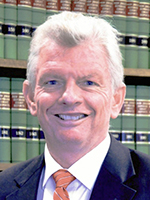
Joseph E. Krakora was originally sworn in as Public Defender in 2011 and is currently serving his second five year term. Under his leadership, the New Jersey State Office of the Public Defender has built a reputation as one of the best offices in the country. Mr. Krakora has recruited talented attorneys from diverse backgrounds, expanded the office’s training programs, and upgraded the agency’s technology and facilities. He has become an influential stakeholder in New Jersey’s justice system on many issues, having spearheaded the pretrial release reform that eliminated monetary bail, advocated for sentencing reform on New Jersey’s Sentencing Commission, and directed the filing of three successful Orders to Show Cause in the Supreme Court for release of jail and prison inmates during the pandemic.
Mr. Krakora joined the NJOPD in 1986 and has held numerous positions in the agency since that time. He spent a number of years as both a staff attorney and a manager in the Essex Region where he developed a reputation as one of the top criminal defense attorneys in New Jersey gaining recognition for numerous acquittals in high profile cases. He served as the agency’s Assistant Public Defender and Director of Capital and Special Litigation from 2002 until 2010. In that capacity he served on the Death Penalty Study Commission as a strong advocate for its abolition and handled numerous death penalty cases until the abolition of the death penalty in December 2007. Mr. Krakora is a graduate of Princeton University and Cornell University School of Law.
Professional Highlights
- Started with the OPD Essex Trial Region in 1986
- Served as the First Assistant Deputy in Essex overseeing defense of all homicide cases
- Represented approximately 30 clients facing death penalty and tried 11 capital cases to verdict
- Served as Director of Capital Litigation for the Office of the Public Defender
- Represented the OPD on Death Penalty Study Commission that recommended abolition
- Featured in 4 front page NJ Law Journal articles after acquittals on high profile cases
- Handled State v. Henderson litigation at the remand hearing and before the NJ Supreme Court
- Member of Criminal Disposition and Sentencing Commission (CDSC)
- Spearheaded CDSC’s recommendations for reforms including elimination of mandatory minimums for drug offenses and juvenile resentencing
- Filed 3 successful Orders to Show Cause directly in the Supreme Court during the pandemic:
- Leading to the Consent Order that resulted in the release of approximately 700 county jail inmates serving sentences
- Establishing right to due process for State prison inmates eligible for release under Executive Order 124
- Requiring trial courts to consider the impact of the pandemic as a changed circumstance during hearings on motions to reconsider pretrial detention orders
Hon. Carmen Messano, P.J.A.D. (Moderator)
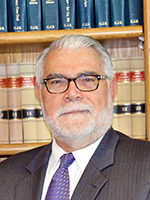
Carmen Messano was appointed to the bench in 1997, after serving from 1991 to 1997 as the Hudson County Prosecutor. He has served on the Appellate Division since 2006 and currently serves as the Presiding Judge for Administration. Prior to that, Judge Messano served in all three divisions of the trial court and was Presiding Judge of the Civil Division in Hudson County.
Judge Messano has served on the Civil Practice Committee, and has chaired the Supreme Court's Committee on the Rules of Evidence for the last twelve years.
He is a Magna Cum Laude graduate of Lafayette College, where he majored in Government and Law and was a member of Phi Beta Kappa. The judge is a 1977 graduate of Boston College Law School.
- Second Panel
Professor Nina W. Chernoff, CUNY School of Law

Nina Chernoff is a Professor at the CUNY School of Law. Professor Chernoff’s research focuses on the jury, primarily the right to a jury selected from a fair cross-section of the community. Her scholarship includes No Records, No Right: Discovery and the Fair Cross-Section Guarantee (2016); Wrong About the Right: How Courts Undermine the Fair Cross-Section Guarantee by Confusing it With Equal Protection (2012); Black to the Future: The State Action Doctrine & The White Jury (2019); and Preempting Jury Challenges: Strategies for Courts and Jury System Administrators, with Dr. Joseph B. Kadane (2012).
Professor Chernoff also works with courts committed to assembling diverse jury pools. For example, she gave the keynote presentation at the Washington State Supreme Court’s symposium on Jury Diversity in Washington: A Hollow Promise or Hopeful Future?, and is currently a consultant to the New Jersey Judiciary. Professor Chernoff also works with attorneys and communities seeking to diversify their jury pools through advocacy or litigation. For example, she recently helped write a letter recommending improvements to the jury plan of the United States District Court for the Southern District of California.
Prior to joining CUNY’s faculty, Professor Chernoff was an Acting Assistant Professor of Lawyering at New York University Law School. Before entering academia, she was a staff attorney in the Special Litigation Division of the Public Defender Service for the District of Columbia (PDS). Prior to PDS, she was a staff attorney and Zubrow Fellow at Juvenile Law Center and served as a law clerk for the Honorable Thomas L. Ambro, U.S. Court of Appeals for the Third Circuit. Professor Chernoff graduated from Georgetown University Law Center, magna cum laude, in 2003; she received her M.S. with distinction in Justice, Law & Society from the School of Public Affairs at American University in 2000, and her B.A. in Sociology from Bryn Mawr College in 1997.
Professor Mary R. Rose, University of Texas at Austin

Mary Rose received an A.B. in Psychology from Stanford University and a Ph.D. in social psychology from Duke University. Formerly a research fellow at the American Bar Foundation, she is currently Professor of Sociology at the University of Texas at Austin, where she teaches courses on social science and law as well as social psychology and research methods. Her research examines lay participation in the legal system and perceptions of justice, and she has written on a variety of topics including the effects of jury selection practices on jury representativeness and citizens’ views of justice, jury trial innovations, civil damage awards, and public views of court practices. She is also an investigator on the landmark study of decision making among 50 deliberating juries from Pima County, Arizona. She has served on the editorial boards of Law & Social Inquiry, Law & Society Review, Criminology, Social Psychology Quarterly, and Law & Human Behavior and is a former trustee of the Law & Society Association. Her research has been cited in numerous court cases, including three U.S. Supreme Court cases: Miller-el v. Dretke (Breyer, J., concurring); Exxon Shipping Co. v. Baker and Ramos v. Louisiana.
Hon. David H. Ironson, J.S.C. (Moderator)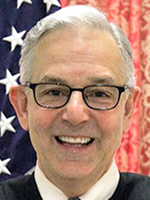
Judge David H. Ironson serves in the Criminal Division in the Morris/Sussex Vicinage. He was appointed to the bench in 2008 and has been assigned to the Civil and Criminal divisions. Judge Ironson graduated from Seton Hall Law and the University of Maryland. He currently serves as Chair of the Supreme Court Committee on Jury Selection in Civil and Criminal Trials and also served as co-chair of the Judiciary Working Group on Juror Impartiality.
- Third Panel
William C. Snowden, The Juror Project

Will Snowden is the proud son of Billy Ray and Kay Snowden who were not only Milwaukee public school teachers, but also taught Will why speaking up and speaking out is important. Will plays the cello, really enjoys dancing but isn’t that good at it, and before his current work as the director of the Vera Institute of Justice in New Orleans, he was a New Orleans public defender for five years where he developed a passion and focus for all things related to jury service. Will started The Juror Project to increase diversity of jury panels and improve people’s perspective of jury duty. Will graduated from Seton Hall University School of Law in 2013.
Gregg L. Zeff, NAACP of New Jersey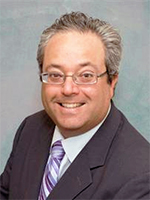
Gregg L. Zeff began practicing civil rights law back in 1988 protecting the rights of prisoners and victims of police misconduct. Since then, his practice has turned toward protecting the rights of all people. Representative clients include, public service, such as police, firefighters, correctional officers, and other civil servants, all aspects of education, including provosts, deans, professors, principals, teachers, students, and custodians. Laborers, including, factory workers, food service workers, railroad workers, office workers. truck drivers, casino workers Professionals, including, executives, doctors, nurses, hospital workers, pharmacists, lab technicians, lawyers, engineers, computer programmers, scientists, social workers and many others. When people fall victim to wrongful employment practices such as racial discrimination, sexual discrimination, retaliation and whistleblowing activities, Zeff Law Firm is there to help.
Zeff has picked juries and jury trials in 3 states. He works extensively in the New Jersey State and Federal Courts as well as the Pennsylvania State and Federal Courts mostly on behalf of plaintiffs in civil rights and employment litigation.
Gregg L. Zeff is the sole shareholder of the Zeff Law Firm, LLC. As a graduate of Delaware Law School of Widener University, he has earned a reputation in New Jersey as an experienced, aggressive representative who is there for his clients when they need support. When you face unlawful treatment you can trust Zeff Law Firm to help you fully understand the legal options you have available for your case.
As an affiliate of numerous community groups and committees including NAACPNJ, Legal Redress Chair, State of New Jersey NAACP, Legal Redress Chair, Pennsylvania State Conference, President, Social Justice Law Project, New Jersey Criminal Sentencing, and Disposition Commission Member, Gregg L. Zeff understands how to help enforce lawful behavior and protect human rights.
Howard H. Berchtold, Jr., Trial Court Administrator (Moderator)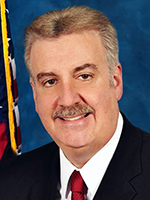
Howard Berchtold is the Trial Court Administrator for the Superior Court of New Jersey, Atlantic and Cape May Counties, a judicial district of both limited and general jurisdiction, with 44 judges and 525 plus staff members, serving in this capacity since 2006. As the highest-ranking staff executive, Mr. Berchtold overseas all court operations, including financial management, human resources, information systems, case management, probation services, jury utilization, facilities, equipment, records management, community outreach and statistical analysis. Beginning his judiciary career in 1981, Mr. Berchtold held numerous positions in the same district, including Jury Manager, Municipal Division Manager, and Assistant Trial Court Administrator.
Mr. Berchtold has served on various statewide committees and boards over the years. Among them are the Strategic Planning Committee for State Unification, the Task Force for Municipal Court Improvement, the Municipal Court Administrator Certification Board, the Advisory Group on Self-Representation, Access and Fairness Committee and the Joint Committee on Criminal Justice Reform. Currently, he sits on the Judicial Council’s Budget & Planning Committee, the Judiciary’s Administrative Council, the Council’s Education and Training Committee, the Hiring Review Board, and the Drug Court Advisory Committee.
Mr. Berchtold is a former faculty member of Widener University Law Center, served on the Board of Advisors for the University’s Court Administration Certification Program, and currently sits on the Advisory Board for Criminal Justice Graduate Studies at The Richard Stockton University of New Jersey. He is a 1986 Fellow of the Institute for Court Management and is the 2012 recipient of the ICM Fellows Star Award. Serving on the Institute’s faculty for over 25 years, he is certified faculty for caseflow management and also is a Facilitator/Faculty member for the Fellows Masters class. He is currently a member of the ICM Advisory Council. Starting in 2019, he has served as faculty for the District of Columbia Courts Management Training Program. An active member of the Mid-Atlantic Association for Court Management since its inception, Mr. Berchtold served as President in 2008. He is also an active member of the National Association for Court Management, often honored to present at their annual conferences. Most recently, Mr. Berchtold has become active with the National Association of Presiding Judges and Court Executive Officers. In 2019, Mr. Berchtold was honored to be inducted into the Warren E. Burger Society.
- Fourth Panel
Andrew J. Bruck, Acting Attorney General
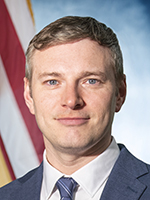
Andrew J. Bruck was appointed by Governor Philip D. Murphy as Acting Attorney General in July 2021. He joined the Office of the Attorney General in January 2018 and served as Executive Assistant AG and then First Assistant AG.
Previously, Bruck spent five years at the U.S. Department of Justice, where he served as an Assistant U.S. Attorney in Newark, New Jersey and held several roles in the office of U.S. Deputy Attorney General Sally Yates, including Senior Counsel and Acting Chief of Staff. Before that, Bruck worked as a litigation associate in the New York office of Davis Polk& Wardwell and clerked for Chief Justice Stuart Rabner of the New Jersey Supreme Court.
A graduate of Princeton University and Stanford Law School, Bruck is a New Jersey native who currently resides in Trenton with his husband Adam and daughter Libby. Bruck is the first member of the LGBTQ+ community to serve as New Jersey’s chief law enforcement officer.
Since assuming office, Acting Attorney General Bruck has prioritized three initiatives:
- Racial Justice
- li>Gun Violence
- Policing Policy
Hon. Glenn A. Grant, Administrative Director of the Courts
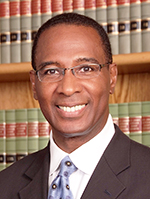
The Honorable Glenn A. Grant, J.A.D., was appointed by Chief Justice Stuart Rabner as Director of the New Jersey Administrative Office of the Courts on September 1, 2008. Under the leadership and direction of the Chief Justice, he provides the day-today management of the court system. He collaborates with the Chief Justice to oversee a court staff of 9,000+ employees, including 460 Superior Court Judges. He is also responsible for overseeing the state municipal courts, comprised of approximately 350 municipal judges and 2,500 administrative staff. The Administrative Director is a constitutional position and Judge Grant is the eighth person to hold the position and the first minority appointed to lead the New Jersey court system.
He joined the bench in 1998, serving as a Family Judge in the Essex vicinage. Prior to the appointment to his current position, Judge Grant served as Presiding Judge of the Family Part. He was temporarily assigned by former Chief Justice Poritz to serve as Acting Chief Judge of the Newark Municipal Court in order to address management and other operational issues.
As Administrative Director, Judge Grant serves as a member of the Judicial Council, the policy-making body of the New Jersey Courts. He also chairs or is a member of several New Jersey Supreme Court committees, including the Advisory Committee on Access and Fairness and the Joint Committee on Criminal Justice Reform. Judge Grant has recently chaired the Working Group on Municipal Courts and the Judiciary Special Committee on Landlord Tenant. He currently serves as Chair of the Judiciary Opportunities for Building Success (“JOBS”) program.
Prior to his judicial career, Judge Grant served as corporation counsel and business administrator for the City of Newark. He received his bachelor’s degree in political science from Lehigh University and his law degree from Catholic University. He studied Executive Management at Harvard University’s John F. Kennedy School of government.
Alexander Shalom, ACLU of New Jersey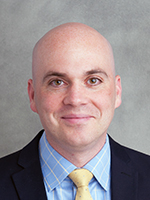
Alexander Shalom is Senior Supervising Attorney and Director of Supreme Court Advocacy at the ACLU-NJ. Alex primarily litigates cases on issues that disproportionately impact people of color. He appears in state and federal trial and appellate courts on cases addressing a wide range of issues. He has appeared more than seventy times before the New Jersey Supreme Court on cases focusing on issues including pretrial justice, the right to counsel, sentencing, search and seizure, and public access to police records. As Director of Supreme Court Advocacy, he oversees the ACLU-NJ’s work before the State Supreme Court, where they appear more often than any other non-governmental organization.
Before joining the ACLU-NJ, Alex worked as an Assistant Deputy Public Defender in Essex County. Prior to that, he served as capital cases clerk for Hon. Deborah J. Poritz, Chief Justice of the New Jersey Supreme Court.
Lee A. Solomon, Associate Justice (Moderator)
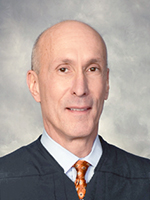
Lee A. Solomon, Esquire is an Associate Justice of the Supreme Court of New Jersey. He was nominated by Governor Christopher J. Christie and confirmed by the Senate on June 19, 2014.
Prior to being appointed, Lee served as the Assignment Judge of the Camden County, New Jersey, Superior Court, in which he was also nominated by Governor Christie and confirmed by the Senate to return to the bench on December 15, 2011, and initially was assigned to hear cases in the Civil Division. He was Presiding Judge of the Criminal Division before becoming the Assignment Judge.
Lee spent two years, between February 2010, and December 2011, as President of the New Jersey Board of Public Utilities (BPU) and a member of Governor Christie’s Cabinet. The BPU has jurisdiction over utility rates and facilities, and works to ensure consumer access to safe, reliable, and efficient services at reasonable costs.
Before serving as BPU President, Lee had been a Camden County Superior Court Judge. He was appointed by Acting Governor, Senate President, Richard J. Cody, confirmed by the Senate, and sworn in as a member of the Court on January 13, 2006. He began in the Family Division before being assigned to the Criminal Division.
Previously, Lee served as the Deputy United States Attorney for the Southern Vicinages, District of New Jersey. On June 4, 2002, he was sworn in by Christopher J. Christie, U.S. Attorney, District of New Jersey. Lee led the U.S. Attorney’s Offices in Camden and Trenton. He managed a staff of forty-seven Assistant U.S. Attorneys and support personnel. The office handled approximately 950 cases per year.
Prior to his appointment to the U.S. Attorney’s Office, Lee served five years as the Camden County Prosecutor and one year as Acting Prosecutor. In this position, he directed an office with a staff of more than 260 and the State’s third largest caseload. During that time, Lee served on the Board of the National District Attorneys Association and as Chairperson of the New Jersey Juvenile Justice Advisory Council. In November of 1998, the New Jersey Attorney General appointed Lee as the Monitor of the Camden City Police Department. He then reorganized the 390 member force and continued its supervision until leaving the post of Camden County Prosecutor.
Before his prosecutorial appointment, Lee served five years in the New Jersey General Assembly. He served as Vice-Chairman of the Environmental Quality Committee and as a member of the Assembly Policy & Rules Committee. In addition, Lee served as Vice-Chairman of the Assembly Judiciary Committee, Vice-Chairman of the Law and Public Safety Committee, and Chairman of the Subcommittee on Criminal Justice.
Earlier, Lee served two years as a member of the Camden County Board of Chosen Freeholders. As Chairman of the Finance Committee for the Freeholder Board, Lee Solomon wrote the first budget that reduced the tax rate for county taxpayers. Lee also was the Chairman of the Public Safety Committee, which was responsible for the Camden County Park Police and the Fire Marshal’s Office. From 1986 to 1994, Lee served as a member of the Haddon Heights Borough Council.
- Fifth Panel
Hon. Edward J. McBride, Jr., P.J.Cr.
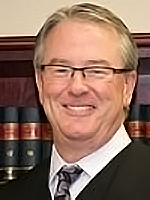
Edward J. McBride, Jr., was appointed to the Superior Court of New Jersey and began his service on the bench in Camden County on February 1, 2010. He served in the Criminal Division until September 1, 2011, when he began serving in the Family Division. On November 20, 2013, he was assigned again to the Criminal Division and designated as Presiding Judge. Judge McBride currently chairs the Conference of Criminal Presiding Judges. He chaired the Supreme Court Committee on Criminal Practice during its 2018-2019 and 2020-2021 terms and served as the co-chair of the Working Group on Juror Impartiality.
Camelia M. Valdes, Passaic County Prosecutor
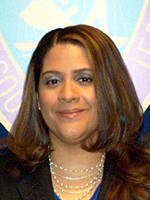
Camelia M. Valdes is the Passaic County Prosecutor. When Ms. Valdes was nominated on May 16, 2009 by Governor Jon S. Corzine and confirmed by the New Jersey State Legislature, she became the first Latina county prosecutor in the State of New Jersey, the first woman prosecutor in Passaic County, and the first lead prosecutor of Dominican ancestry in the United States. As the chief law enforcement official in Passaic County, Ms. Valdes is responsible for the management of approximately 185 assistant prosecutors, detectives, victim advocates and support staff, a $20 million office budget and the oversight of 16 municipal police departments, the police departments of William Paterson and Montclair State Universities and the Passaic County Sheriff’s Department.
Ms. Valdes is a career prosecutor. She served as a Municipal Prosecutor in the City of Newark, a Deputy Attorney General in the New Jersey Attorney General’s Office, an Assistant Governor’s Counsel to Governor Christine Todd Whitman and Acting Governor Donald T. DiFrancesco, and as an Assistant United States Attorney in the U.S. Attorney’s Office in Newark. Her experience has ranged from investigating and prosecuting municipal offenses to complex federal crimes that included human trafficking, health care fraud, financial offenses, and violent crimes.
Born to Dominican parents in the Bronx and raised in Newark, New Jersey, Ms. Valdes is a product of the Newark Public Schools. She received her undergraduate degree in sociology from Seton Hall University in 1993, her law degree from Rutgers Law School-Newark in 1996 and her LL.M. in Trial Advocacy from Temple University in May 2001. As the proud mother of two teenagers with autism, Isabela and Elsa, ages 17 and 15, Ms. Valdes endeavors to raise awareness about autism.
Hon. Hany A. Mawla, J.A.D. (Moderator)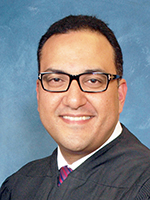
Hany A. Mawla is a Judge of the Appellate Division. He was formerly the Presiding Judge of the Family Division for Vicinage XIII Somerset, Hunterdon, and Warren Counties and the Civil and Supervising Judge for the Special Civil Part for Vicinage XIII. Prior to joining the bench, Judge Mawla was a partner in the litigation department of the law firm of Greenbaum, Rowe, Smith & Davis LLP. He is the Chair of the New Jersey Supreme Court Diversity, Inclusion, and Community Engagement Committee, Vice-Chair of the Supreme Court Advisory Committee on Access and Fairness, a member of the New Jersey Supreme Court Family Practice Committee and Chair of its dissolution subcommittee. He has lectured for the New Jersey Institute for Continuing Legal Education, the New Jersey Association for Justice, and the New Jersey Judicial College. Judge Mawla received his undergraduate degree from Rutgers University, law degree from Seton Hall University School of Law, and an Honorary Degree from Raritan Valley Community College where he was a lecturer. He received the Justice Thurgood Marshall Award and the Distinguished Service Award from the New Jersey State Bar Association. Judge Mawla is a Fellow of the American Bar Foundation.
- Sixth Panel
Hon. Robert M. Brutinel, Chief Justice, Supreme Court of Arizona
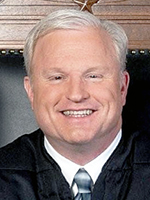
Chief Justice Brutinel became Chief Justice on July 1, 2019. He was appointed to the Arizona Supreme Court in November of 2010 and was elected as Vice Chief Justice in January 2018. Prior to his appointment, Justice Brutinel served as the Presiding Judge of the Yavapai County Superior Court, where he presided over cases involving civil, criminal, juvenile, mental health, drug court, probate and domestic relations matters.
Justice Brutinel currently serves on the Board of Directors of the Conference of Chief Justices and has served on the Arizona Supreme Court Committee on Juvenile Courts, the Arizona Supreme Court Commission on Technology, the Arizona Commission on Judicial Conduct, the Supreme Court Arizona Judicial Council, the Arizona Character Education Commission, and the Governor’s Children’s Cabinet. Justice Brutinel is a past president of the Arizona Judges Association and the Yavapai County Bar Association and has served as an Advisory Board Member for the Arizona Department of Juvenile Corrections. In 2010 Justice Brutinel was chosen as the National Court Appointed Special Advocates (CASA) Judge of the Year.
Justice Brutinel graduated from Arizona State University with a B.S. in Economics in 1979. He received his law degree from the University of Arizona in 1982 and an LL.M. in Judicial Studies from Duke University in 2018. Justice Brutinel was admitted to practice law in Arizona in 1982. Prior to serving as a judge he practiced law in Prescott, Arizona, primarily in the areas of business and real estate, and Indian Law.
Hon. Steven C. González, Chief Justice, Supreme Court of Washington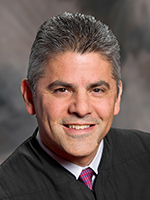
Chief Justice Steven C. González was sworn in as the Supreme Court’s 58th Chief Justice on January 11, 2021. He was appointed to the court effective January 1, 2012, and subsequently won two contested races for six-year terms starting in 2013 and 2019. Before joining the Supreme Court, Chief Justice González served for ten years as a trial judge on the King County Superior Court hearing criminal, civil, juvenile, and family law cases.
Passionate about access to justice, he has served on several boards and commissions coordinating access to justice efforts across Washington state. He served as Chair of the Supreme Court’s Interpreter Commission for eight years, supporting efforts to enhance language access across the state, including amendments to general rules that address remote interpreting as courts respond to the COVID-19 pandemic and set protocols for team interpreting.
Chief Justice González’s work has earned him numerous awards and honors including, the “2022 Spirit of Excellence Award” from the American Bar Association’s Commission on Racial and Ethnic Diversity in the Profession; the "2012 Difference Makers Award" from the American Bar Association’s Solo, Small Firm and General Practice Division, the Justice CZ Smith Trailblazer Award and the Exceptional Member Award from the Latina/o Bar Association of Washington, and "Judge of the Year" awards from the Washington State Bar Association, the Washington Chapter of the American Board of Trial Advocates, and the Asian Bar Association of Washington in 2011.
Chief Justice González earned a J.D. from U.C. Berkeley School of Law and Honorary Doctor of Laws Degrees from Gonzaga University School of Law in 2011 and the University of Puget Sound in 2015.
Hon. Richard A. Robinson, Chief Justice, Supreme Court of Connecticut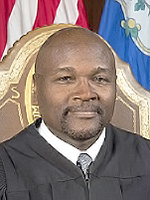
The Honorable Richard A. Robinson was born December 10, 1957 in Stamford, Connecticut. He graduated with a Bachelor of Arts Degree from the University of Connecticut in 1979 and a Juris Doctor degree from West Virginia University School of Law in 1984. He was admitted to the West Virginia Bar and the Connecticut Bar, and is a member of the U.S. District Court, Northern District of West Virginia and the U.S. District Court, Connecticut.
From 1985 - 1988, Justice Robinson was Staff Counsel for the City of Stamford Law Department. In 1988, he became Assistant Corporation Counsel in Stamford where he remained until his appointment as a Judge of the Superior Court in 2000. He remained a Superior Court Judge for the next seven years during which time he served as Presiding Judge (Civil) for the New Britain Judicial District (May 2003 - September 2006); Presiding Judge (Civil) and Assistant Administrative Judge for the Ansonia/Milford Judicial District (September 2006 - September 2007); and Presiding Judge (Civil) for the Stamford Judicial District (September 2007 - December 2007). He was appointed as a Judge of the Connecticut Appellate Court on December 10, 2007, a Justice of the Supreme Court on December 19, 2013 and the Chief Justice of the Supreme Court on May 3, 2018.
Justice Robinson’s career is complemented by an array of public and judicial service. He served as President of the Stamford Branch of the NAACP (1988-1990); General Counsel for the Connecticut Conference of the NAACP (1988 - 2000); President of the Assistant Corporation Counsel’s Union (AFSCME) (1989 - 2000); Commissioner of the Connecticut Commission on Human Rights and Opportunities (1997 - 2000); Chair of the Connecticut Commission on Human Rights and Opportunities (1999 - 2000); New Haven Inn of Court member (2002 - present); Judicial Education Curriculum Committee member (2002 - 2014); Judicial Education Committee member (2003 - 2014); Faculty at several Judicial Institutes as well as spring and fall lectures (2003 - present); Civil Commission member (2005 - 2014); Court Annexed Mediator (2005 - 2014); Lawyers Assistance Advisory Board member (2007 - present); Bench-Bar Foreclosure Committee (2007 - 2014); Legal Internship Committee (2013 - 2017); Chairperson of the Advisory Committee on Cultural Competency (2009-present); Chairperson of the Rules Committee (2017- present); Connecticut Bar Association Young Lawyers Section Diversity Award (2010); Connecticut Bar Association's Henry J. Naruk Judiciary Award for Integrity (2017); NAACP 100 Most Influential Blacks in Connecticut; Connecticut Bar Foundation James W. Cooper Fellows, Life Fellow; Discovering Amistad National Advisory Board; Commission on Human Rights and Opportunities’ Alvin W. Penn Award for Excellence in Leadership (2018); Ebony Magazine Power 100 Award (2018); Quinnipiac School of Law Black Student Association Thurgood Marshall Award (2019); ABOTA Judicial Excellence Award (2019); Connecticut Bar Foundation Distinguished Service Award (2020); National Board of Directors of the Conference of Chief Justices (2019 - present); Conference of Chief Justices Civil Justice Board of Directors (2020 - present); National Judicial Task Force to Examine State Courts’ Response to Mental Illness (2020 - present).
Hon. Stuart Rabner, Chief Justice (Moderator)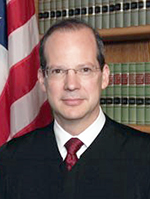
Chief Justice Stuart Rabner was sworn into office on June 29, 2007 after being nominated by Governor Jon S. Corzine and confirmed by the Senate. He is the eighth Chief Justice to lead the New Jersey Supreme Court since the 1947 Constitution.
Born on June 30, 1960, Chief Justice Rabner was raised in Passaic. He graduated summa cum laude from the Woodrow Wilson School of Public and International Affairs at Princeton University in 1982. He graduated cum laude from Harvard Law School in 1985. He was a law clerk to U.S. District Court Judge Dickinson R. Debevoise before joining the U.S. Attorney's Office in Newark in 1986.
After beginning his career as an assistant U.S. attorney, Chief Justice Rabner worked in a number of positions including first assistant U.S. attorney and chief of the terrorism unit. He was chief of the office's criminal division when he was named chief counsel to Governor Corzine in January 2006. He was named New Jersey attorney general in September 2006 and served in that position until his nomination to the Court.
Chief Justice Rabner and his wife, the former Deborah Wiener, have three children.
- Endnote
Hon. Morris Hoffman, Colorado State District Court Judge (Ret.)
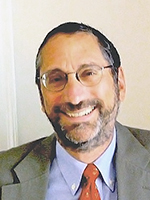
Morris Hoffman was a district judge in the state of Colorado from February 1991 through his retirement in May 2021. During the course of his 30 years on the bench, he sat in each of his court’s three divisions (divorce, civil, and criminal), acting as the presiding judge for many years in the civil and criminal divisions. In addition to innumerable civil bench trials, he presided over a total of 426 civil and felony criminal jury trials. He also presided over the Denver statutory grand jury for more than 10 years. He was a member of the Colorado Supreme Court’s Multidistrict Litigation Panel for 18 years, and served as its chair the last 8 years. He was also a member of the Colorado Supreme Court’s Advisory Committee on the Rules of Criminal Procedure for 20 years. He has taught jury history and selection, law and the biology of human nature, and law and neuroscience at the law schools at the University of Colorado, Boulder, and the University of Denver. He is a member of the John D. and Catherine T. MacArthur Foundation’s Research Network on Law and Neuroscience, and a research fellow at the Gruter Institute for Law and Behavioral Research. He has published dozens of law review articles in the areas of criminal law, the jury, jurisprudence, and law and neuroscience, as well as several science papers focusing on the neuroscience of punishment. He has also published several law-related op-eds in national newspapers, including The New York Times and the Wall Street Journal. His book, The Punisher’s Brain: An Evolutionary History of Judge and Jury, was published in 2014 by the Cambridge University Press as part of the Cambridge Studies in Economics, Choice and Society. He lives in Denver with his wife Kate. They have two grown sons, two granddaughters, and a new black dog.
Case Law
- Batson v. Kentucky, 476 U.S. 79 (1986)
- State v. Gilmore, 195 N.J. Super. 163 (App. Div. 1984)
- State v. Gilmore, 199 N.J. Super. 389, 394 (App. Div. 1985), aff'd, 103 N.J. 508 (1986)
- State v. Gilmore, 103 N.J. 508 (1986) (reprinted from Westlaw with permission of Thomson Reuters)
- State v. Andujar, 247 N.J. 275 (2021)
- State v. Dangcil, ___ N.J. ___ (2021)
Additional Resources
- April J. Anderson, Peremptory Challenges at the Turn of the Nineteenth Century: Development of Modern Jury Selection Strategies as Seen in Practitioners’ Trial Manuals, 14 Stan. J. C.R. & C.L. 1 (2020)
- Hon. Mark W. Bennett Unraveling the Gordian Knot of Implicit Bias in Jury Selection: The Problem of Judge-Dominated Voir Dire, the Failed Promise of Batson, and Proposed Solutions, 4 Harv. L. & Pol’y Rev. 149 (2010)
- Nina W. Chernoff, No Records; No Right: Discovery & the Fair Cross-Section Guarantee, 101 Iowa L.R. 1719
- Hon. James H. Coleman, Jr., The Evolution of Race in the Jury Selection Process, 48 Rutgers L. Rev. 1105 (1996)
- Aliza Plener Cover, Hybrid Jury Strikes, 52 Harv. C.R.-C.L. L. Rev. 357 (2017) (posted with permission of the Harvard Civil Rights – Civil Liberties Law Review).
- Whitney DeCamp and Elise DeCamp, It’s Still About Race: Peremptory Challenge Use on Black Prospective Jurors, J. of Res. in Crim. and Delinq. 57 (2020) available at https://journals.sagepub.com/doi/full/10.1177/0022427819873943
- Daniel Edwards, The Evolving Debate Over Batson’s Procedures for Peremptory Challenges, National Association of Attorneys General (Apr. 14, 2020),
- Ann M. Eisenberg, Removal of Women and African Americans in Jury Selection in South Carolina Capital Cases, 1997-2012, 9 Ne. U. L. Rev. 299 (2017)
- Roger Enriquez & John W. Clark III, The Social Psychology of Peremptory Challenges: An Examination of Latino Jurors, 13 Tex. Hisp. J. L. & Pol’y 25 (2007). As originally published in Texas Hispanic Journal of Law & Policy.
- Equal Justice Initiative Resources
- Equal Justice Initiative, Illegal Racial Discrimination in Jury Selection: A Continuing Legacy (2010) available at https://eji.org/wp-content/uploads/2019/10/illegal-racial-discrimination-in-jury-selection.pdf
- Equal Justice Initiative, Race and the Jury: Illegal Discrimination in Jury Selection (2021) available at https://eji.org/report/race-and-the-jury/
- Catherine M. Grosso & Barbara O’Brien A Stubborn Legacy: The Overwhelming Importance of Race in Jury Selection in 173 Post-Batson North Carolina Capital Trials, 97 Iowa L. Rev. 1531 (2012).
- Hon. Morris B. Hoffman, Peremptory Challenges Should Be Abolished: A Trial Judge’s Perspective, 64 U. Chi. L. Rev. 809 (1997) (Originally appearing in the University of Chicago Law Review, 64 U. Chi. L. Rev. 809. Reprinted with permission from the University of Chicago Law Review and the University of Chicago Law School.)
- Liz McCurry Johnson, Accessing Jury Selection Data in a Pre-Digital Environment, 41 Am. J. Trial Advoc. 45 (2017).
- Jerry Kang et. al., Implicit Bias in the Courtroom, 59 UCLA L. Rev. 1124 (2012). Originally published by the UCLA Law Review; available at https://www.uclalawreview.org/implicit-bias-in-the-courtroom-2/.
- Jerry Kang, Trojan Horses of Race, 118 Harv. L. Rev. 1489 (2005).
- Jerry Kang, What Judges Can Do About Implicit Bias, 57 Court Review 78, © Jerry Kang.
- Jerry Kang, What Judges Can Do About Implicit Bias: Evidence-Based Recommendations and Practices, © Jerry Kang.
- Justin D. Levinson, Forgotten Racial Equality: Implicit Bias, Decisionmaking, and Misremembering, 57 Duke L.J. 435 (2007).
- Nancy S. Marder, Justice Stevens, the Peremptory Challenge, and the Jury, 74 Fordham L. Rev. 1683 (2006).
- Hon. Theodore McMillian & Christopher J. Petrini, Batson v. Kentucky: A Promise Unfulfilled, 58 UMKC L. Rev. 361, 362 (1990).
- Kenneth J. Melilli, Batson in Practice: What We Have Learned about Batson and Peremptory Challenges, 71 Notre Dame L. Rev. 447 (1996).
- Caren Myers Morrison, Negotiating Peremptory Challenges, 104 J. Crim. L. & Criminology 1 (2014).
- New Jersey Judiciary Bench Manual on Jury Selection (2014)
- Jeffrey J. Rachlinski et al., Does Unconscious Racial Bias Affect Trial Judges?, 84 Notre Dame L. Rev. 1195 (2009). Vol. 84 NOTRE DAME LAW REVIEW, Page 1195 (2009). Reprinted with permission. © Notre Dame Law Review, University of Notre Dame.
- Report of the Special Supreme Court Committee on Peremptory Challenges and Jury Voir Dire (2005)
- Mary Rose, Final Report on New Jersey’s Empirical Study of Jury Selection Practices and Jury Representativeness (2021)
- Mary R. Rose et al., Jury Pool Underrepresentation in the Modern Era: Evidence from Federal Courts: Jury Pool Underrepresentation in the Modern Era, 15 J. of Empirical Legal Stud. 1 (2018).
- Hans Zeisel & Shari Seidman Diamond, The Effect of Peremptory Challenges on Jury and Verdict: An Experiment in a Federal District Court, 30 Stan. L. Rev. 491 (1978).
Public Comments